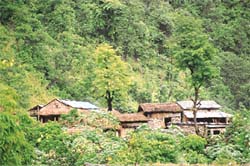Reaping the benefits
 For 30 years, 60-year-old Gyan Bahadur Karki, along with his fellow villagers, has been protecting a 24-hectare (ha) patch of forest in the vicinity of his village Kahnu, near Pokhra. He has been sourcing his fodder and fuelwood needs from the forests since then. "But there is a big difference between the past and the present,' he says. "Earlier the forest belonged to the government so it was illegal, now it has been handed over to us.'
For 30 years, 60-year-old Gyan Bahadur Karki, along with his fellow villagers, has been protecting a 24-hectare (ha) patch of forest in the vicinity of his village Kahnu, near Pokhra. He has been sourcing his fodder and fuelwood needs from the forests since then. "But there is a big difference between the past and the present,' he says. "Earlier the forest belonged to the government so it was illegal, now it has been handed over to us.'
The government handed over the degraded forest to the community in 1997. Thereafter, the villagers adopted rules and regulation set by their forest-users' group ( fug ) committee, comprising traditional users of forest produce. For the 146-member households living in Kahnu village, this change in status is a new-found asset. "At present, the forest provides us with a continuous supply of grass. When we harvest the forest later, it will fetch us hard cash,' says Gyan Bahadur Karki, who is also a member of the village's Jaykot fug committee.
"The money will be used to get drinking water,' says Bimal Basnet, a member of the committee. In its annual plan, the committee has also mentioned spending extra money on community activities like widening trail roads and taking up commercial plantation of bamboo and cardamom.
Every year, each member of the fug contributes approximately us $3 (Nepali Rs 200) towards the management of the forest. Two forest guards have been employed to keep a watch on the forests. The forest is kept open for only two months in a year, during which time local people are allowed access to collect fuelwood. "Even though it doesn't take care of our annual needs, we manage with whatever we collect during this period,' says Shankar Karki, another member of the fug committee. Despite this, he says, there have been no instances of norms being violated.
The villagers see a great future in the forest. Since last year's monsoon, three streams, which had dried up, have started flowing again. "Villagers can see the fruits of their labour so they are getting involved more intensely,' says Tika Karki, founder member of the fug committee (see interview: CFM has changed the concept of community life).
The people of another village near Pokhra, Sarang Kot, also see a great future ahead of them. Famous for the spectacular view of the famous Machapuchare (Fish Tail) mountain, Sarang Kot is a densely-forested hill. "It wasn't like this earlier,' says Man Bahadur Chettri, a member of the village's fug , named Aushadi Thotne after a medicinal plant. Since 1990, 52 households took up the task of rejuvenating a 14-ha patch of land. Today, it has reached harvesting stage. "The forest means everything to us. It gives us fodder, fuelwood and leaf litter. It's a perfect home,' says Sita Chettri, deputy chairperson of the fug committee.
The villagers meet on the first Saturday of every month to assess reforestation activities. Grazing is banned. All fug members are entitled to a tree each year, for which they have to apply to the committee. Their need is then verified and, if granted permission, the villager concerned is allowed to cut a tree. The harvesting is also done in a sustainable manner. In Sarang Kot, for instance, the fug has divided the forest into five parts. "The fug decides which part should be harvested or which one needs close monitoring depending on the rate of regeneration,' says Nauraj Chettri, a teacher in the local school and the treasurer of the committee.
With the regeneration of forests, birds and a few other animals have been spotted in the Sarang Kot forest. "We are seeing wildlife in the forest after a gap of two decades,' says Nauraj Chettri. To protect the animals, the committee has enacted a set of rules. Punishment for poaching is decided according to the species. The committee penalises the poacher for the first and second time. But, if caught for the third time, the poacher is handed over to the police.
CFM at its best
Kahnu and Sarang Kot are two examples of Nepal's community forest movement. In the face of rapid deforestation, the Nepalese government is handing over all accessible forests
Related Content
- Tanzania economic update: overcoming demographic challenges while embracing opportunities
- Nigeria development update, December 2023
- Technology and innovation report 2023: opening green windows
- Doubling the global share of renewable energy: a roadmap to 2030
- The impact of digital infrastructure on African development
- How to advance sustainable mining
